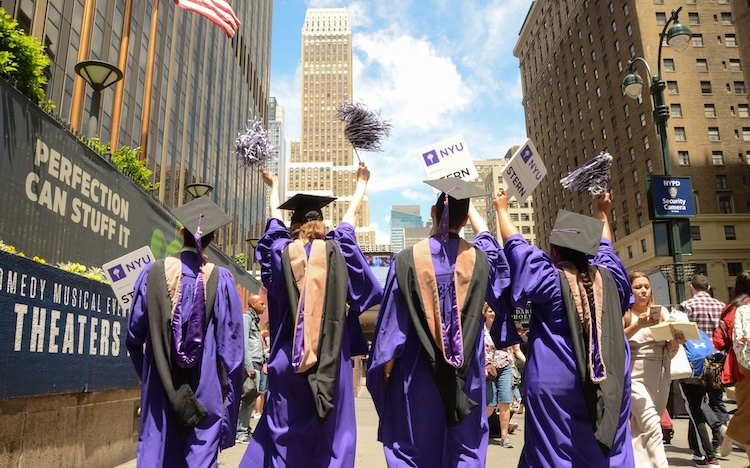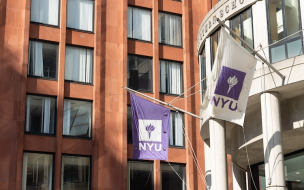If you're considering applying to NYU Stern, you need to understand what kind of students fill the MBA class and how to leverage your own experience and background in your application.
NYU Stern received 4,550 applications, admitted 1,141 students, and enrolled 352, with an admission rate of 25% in the class of 2026. Applications to NYU Stern were up a massive 48% on the previous year, after dropping 13% in 2023.
Students in the NYU Stern MBA class of 2026 include professionals from financial services, nonprofits, the arts, and education, technology, engineering, law, the military, and more than 50 nationalities are represented in the class.
In this BusinessBecause Breakdown, we explore the NYU Stern MBA class profile, covering class GMAT scores, diversity statistics, and students' previous experiences.

NYU Stern MBA class of 2026 | Overview
The entering MBA class of 2026 is academically impressive. There are students with a range of undergraduate majors from engineering, math, and science, to social science, economics, and the humanities. The class also has an average GMAT score of 733, a high score which is becoming a staple of the NYU Stern MBA class considering the previous cohort's average score of 732, and the Class of 2024’s score of 733.
However, the new average GMAT score for NYU will look different in future, in light of the new scoring scale for the GMAT.
The average age of the MBA cohort is 28, with the youngest in the class aged 22 and the oldest 39. To enroll in the MBA class at NYU Stern means enrolling in a classroom fueled by diversity. Female representation sits at 47% in this cohort, up from the previous year’s 43%, and the highest in...
Class of 2026 Pre-MBA Industry
GMAT scores
As the standardized admissions test for business schools, the GMAT scores of an MBA class are a good benchmark for assessing a class's quality.
Looking at the average GMAT score for your target schools is a good way to understand the score range you should be aiming for. It also gives an indication of the caliber of students you'll be surrounded by in the classroom.
However, the GMAT scoring system changed in 2024 as part of a new iteration of the test, meaning a good GMAT score for your MBA will now look different to previous years. Alongside an updated exam structure, the GMAT still sees test-takers graded in 10-point intervals, but with the minimum score being 205 and the maximum score being 805 (a change from the previous range of 200-800).
The median GMAT for the NYU Stern MBA class of 2026 was 733, based on the GMAT scoring scale that was in place in previous years. This score places them at around 685-695 for candidates taking the GMAT after February 2024, which is achieved by the top 4% of all GMAT takers.
This means students are surrounded by academically sharp professionals. The work needed to achieve a GMAT score of over 700 (which now equates to 645) also implies the MBA class of 2026 at NYU Stern is not just academically smart, but ambitious and hungry for a challenge.
GMAT is not everything however and admissions staff will want to see a full package of academic strength, personality, emotional intelligence, and long-term ambition.
Undergraduate majors/GPA
MBA admissions staff are tasked with recruiting an academically as well as professionally diverse cohort. After all, one of the major pull factors of an MBA is being surrounded by like-minded professionals with an array of backgrounds that broaden your perspective and push you to think differently.
There is also an emphasis on recruiting students from 'non-traditional' backgrounds, that is backgrounds that don't align symmetrically with the business world. Bringing in students from the humanities, for example, can contribute to better in-class discussion, as these students may have already learned to see things from multiple perspectives and have developed empathy during their degrees.
Engineering students too are a plus, bringing in the technical knowledge that can help solve complex business problems. Being able to work effectively with diverse teams is also a prerequisite for many post-MBA jobs.
Class of 2026 undergraduate majors
The NYU Stern MBA class of 2026 is filled with such diversity. There are of course students with business and economics degrees, but they are equaled by the number of engineering, math, and science undergrads. Those from a social science background make up 15% of the class, and students from the humanities and the arts account for 12%. The average GPA among the class is also a strong 3.64 while the highest GPA scores reach an impressive 4.00.
This doesn't just mean that in class you have a varied, diverse base for strong group discussion, it also means that if you're looking at studying an MBA at NYU Stern, your 'non-traditional' background shouldn't put you off.

MBA work experience
Anyone graduating from an MBA wants to feel like they have been academically challenged, and given ample opportunity for practical experience, but also that they've spent time in class building up an array of industry perspectives and developing the ability to think cross-functionally and approach complex business problems with a new way of thinking.
The NYU Stern MBA class of 2026 delivers on that front, with incoming students entering the class from a wide range of industries, with a range of 0-16 years of work experience. Most students enter the class from financial services, with consulting following in second place, and technology in third.
There is an eclectic mix of pre-MBA industries, with 8% of students from the military and government, 6% apiece from entertainment and media, nonprofit, arts, and education, and healthcare and pharmaceuticals. Consumer products/retail and real estate are each represented by 5% of the class.
3% of the class hails from advertising and public relations; 2% each comes from manufacturing, law, and engineering. 1% of the class comes from the energy industry.

NYU Stern saw a surge in admissions for the latest cohort and has enrolled a class similar in size and caliber to previous years. The class of 2026 remained consistent with the records set by the previous two years for their GPA and GMAT attainment and these have held steady for the incoming class.
The program, with its diverse mix of undergrad majors, means that it's an option for students from both traditional and 'non-traditional' backgrounds. It's the program for you whether you're a consultant with a few years of experience, working in finance, or embedded in the arts or nonprofit sectors. Nearly half of the class are from minority backgrounds and nearly half are international.
Despite the strong in-class diversity, the career destinations for NYU Stern's typical MBA class falls into the traditional MBA triumvirate of consulting, finance, and tech. Typically around 40% of students enter consulting, 20-30% entered finance, and 10-15% enter tech.
If you're looking to enter more niche sectors, like healthcare or entertainment, you may be better suited looking elsewhere—although a handful of students do enter these industries from the NYU Stern MBA.

Register for free to continue reading
RECAPTHA :
ba
ec
f5
d3













The best of our Premium Articles